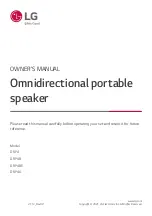
30 | Westinghouse Outdoor Power Equipment
BATTERY REPLACEMENT
1. Remove the spark plug wire from spark plug.
2. Loosen and remove the bolt on the battery hold
down plate and swing the plate out.
3. Tip the battery forward slightly to access battery
cables.
4. Disconnect the black negative (-) battery cable from
the battery first.
5. Disconnect the red positive (+) battery cable second
and remove the battery.
NOTICE
Dispose of the used battery properly according to the
guidelines established by your local or state government.
6. Install the new battery into the generator frame.
Battery must meet specifications in table below to
work properly.
7. Connect the red positive (+) battery cable to the
battery first.
8. Connect the black negative (-) battery cable to the
battery second.
9. Install the battery hold-down plate using the nuts
removed in step 2.
10. Install the spark plug wire onto spark plug.
See below for the battery specification
when replacing the battery.
Westinghouse Part No.
191010
After Market Battery Model
YTX14-BS
Volts
12V
Amp Hr
14Ah
Dimensions
6in by 3
7/16
in by 5
3⁄4
in
CLEANING THE GENERATOR
It is important to inspect and clean the generator after
every use.
Clean All Engine Air Inlet and Outlet Ports
– Make sure
all engine air inlet and outlet ports are clean of any dirt
and debris to ensure the engine does not run hot.
Clean All Engine Cooling Fins
– Use a damp rag and
a brush to loosen and remove all dirt on or around the
engine’s cooling fins.
Clean All Alternator Cooling Air Inlets and Exhaust
Ports
– Make sure the cooling air inlets and exhaust
ports of the alternator are free of any debris and
obstructions. Use a vacuum cleaner to remove dirt and
debris stuck in the cooling air inlets and exhaust ports.
General Cleaning of the Generator
– Use a damp rag to
clean all remaining surfaces.
STORING GENERATOR
WARNING
Never store a generator with fuel in the tank indoors
or in a poorly ventilated area where the fumes can
come in contact with an ignition source such as a:
1) pilot light of a stove, water heater, clothes dryer or
any other gas appliance; or 2) spark from an electric
appliance.
NOTICE
Gasoline stored for as little as 60 days can go bad, causing gum,
varnish and corrosive buildup in fuel lines, fuel passages and the
engine. This corrosive buildup restricts the flow of fuel, preventing an
engine from starting after a prolonged storage period.
Proper care should be taken to prepare the generator for
any storage.
1. Make sure the Engine Switch is switched to
STOP
so
the generator does not draw power from battery.
2. Clean the generator as outlined in
Cleaning the
Generator
.
3. Drain all gasoline from the fuel tank as best as
possible.
4. With the fuel shut off valve open, start the engine
and allow the generator to run until all the remaining
gasoline in the fuel lines and carburetor is consumed
and the engine shuts off.
5. Close the fuel shut off valve.
6. Drain the remaining gas in the carburetor float bowl
outlined in
Draining Carburetor Float Bowl
.
7. Change the oil (see
Changing Engine Oil
).
8. Remove the spark plug (see
Spark Plug Maintenance
)
and place about 1 tablespoon of oil in the spark plug
opening. While placing a clean rag over the spark
plug opening, slowly pull there coil handle to allow the
engine to turn over several times. This will distribute
the oil and protect the cylinder wall from corroding
during storage.
9. Replace the spark plug (see
Spark Plug Maintenance
).
10. Move the generator to a clean, dry place for storage.
MAINTENANCE
















































